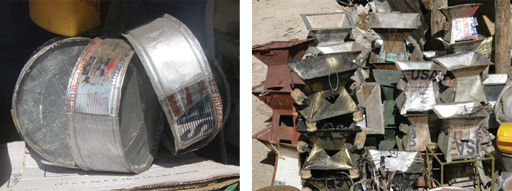8.5 Waste recycling
Recycling waste means that the material is reprocessed before being used to make new products. The reprocessing activities can have an impact on people’s health and the environment, but these impacts are usually lower than those from making the product from new, raw materials. Recycling means treating the materials as valuable resources rather than as waste. It has many benefits but it is important to have a market for the end product, otherwise the process will not be economically sustainable.
The options for recycling depend on the type of waste. For example, waste paper can be broken down to its fibres in a process called pulping. The pulp is cleaned and then formed into new paper to be used for printing or packaging. Waste metals and glass can also be recycled by melting them down into new raw materials. Sheet metals can be beaten and reformed into new products (Figure 8.3). Plastic bottles can be ground down and used to make plastic rope or plastic coating for electric wires. For some wastes, recycling involves complex technical processes and requires specialised machinery, but others can be recycled more simply and on a small scale. All types of organic waste can be recycled by composting, which can be carried out at home or on a larger scale. Composting is described in Section 8.5.2.

8.4 Benefits of reducing and reusing solid waste
